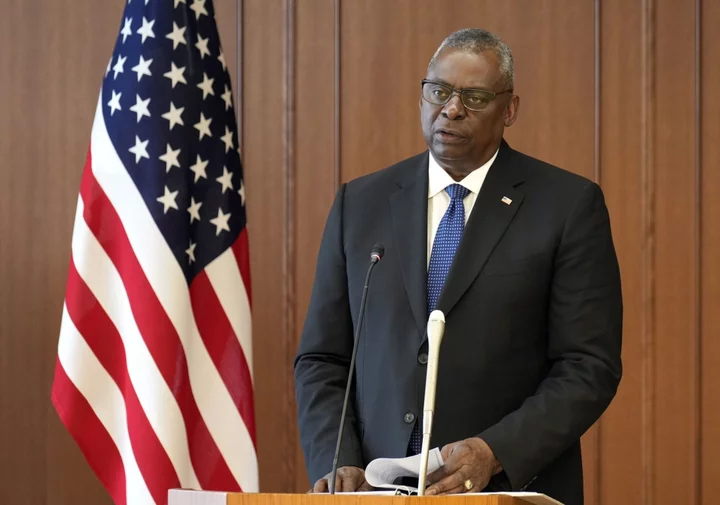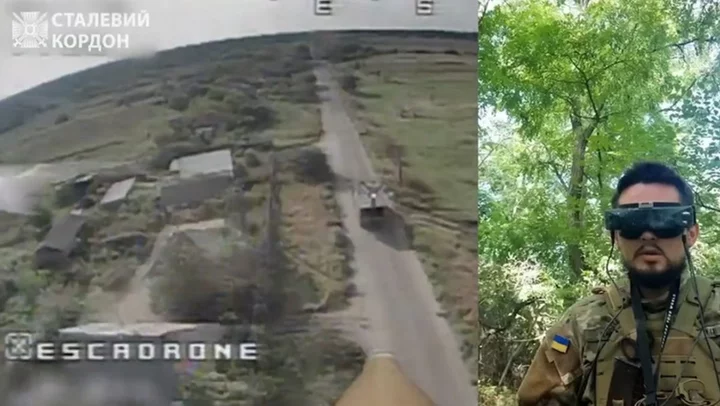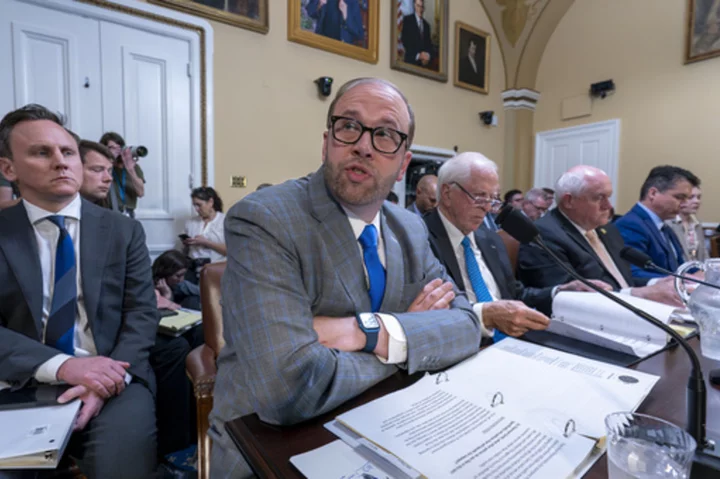A highly anticipated defense forum in Singapore kicked off with a friendly handshake between Pentagon chief Lloyd Austin and Chinese Defense Minister Li Shangfu. It ended Sunday with few other signs of optimism that the world’s biggest economies could avoid an eventual collision.
Austin used his speech at the Shangri-la Dialogue to chide China over its refusal to meet unless the US lifted sanctions on Li, saying that “a cordial handshake over dinner is no substitute for a substantive engagement.” The remarks came as a Chinese vessel harassed an American warship transiting the Taiwan Strait, drawing attention to the biggest potential military flashpoint between the two powers.
Li fired back on Sunday, accusing “some big power” of creating divisive alliances, bullying other nations, spurring an arms race and seeking to contain China with its support for Taiwan. China’s military “will not hesitate for a second” to move on Taiwan if necessary, he said, while dismissing questions about near-collisions in disputed waters. Competing militaries should stay away and “mind your own business,” Li said.
Other countries at the event, meanwhile, repeatedly spoke of the dangers posed by rising US-China tensions and the need to prevent anything like Russia’s war in Ukraine from occurring in Asia.
“There was a real sincerity and urgency that what happened in Ukraine must not happen in Asia,” Singapore Defense Minister Ng Eng Hen told reporters after a lunch that included all of the most senior defense officials at the event. “Many ministers have said if you have a simultaneous war in Europe and Asia it’s catastrophic globally.”
The back-and-forth between the US and China at the annual Shangri-La Dialogue was always expected to be fraught, particularly after President Joe Biden’s administration declined to remove sanctions placed on Li in 2018 over his role in purchasing a Russian missile defense system. It was also the first major defense forum since then-House Speaker Nancy Pelosi’s visit to Taiwan in August prompted China to conduct unprecedented military exercises surrounding the island.
Despite the lack of a US-China breakthrough in Singapore, signs are emerging of increased communication ahead of key summits later this year — the Group of 20 in India and the APEC forum in San Francisco — that will place Biden and Chinese President Xi Jinping in the same room.
CIA Director William Burns made a secret visit last month to meet intelligence officials in Beijing, and a senior US Treasury official last week met with China’s new envoy to the US. Daniel Kritenbrink, the top US State Department official for Asia, is set to travel to China this week.
And while Li didn’t formally meet Austin in Singapore, the Chinese defense minister met with nearly a dozen other delegation heads — including his UK counterpart, Ben Wallace, who emerged from the hour-long conversation saying talks were productive and that he looked forward to visiting China soon. Li also said he had “pretty good” talks with Yasukazu Hamada, the defense minister of Japan, another staunch US ally.
Still, the Singapore meeting underscored growing divisions between China and the US over the basics of the global order. And no issue was more conspicuous than the response to Russian President Vladimir Putin’s invasion of Ukraine, which helped spark a surge in defense spending around the world.
The US and its allies warned of the risks of allowing Russia to keep territorial gains, with German Defense Minister Boris Pistorious saying a Putin victory would send a message “that aggression and unprovoked use of military force are acceptable, can be successful.”
“This is a war where the global rules-based order is on trial,” Australian Defense Minister Richard Marles said. “What happened with the Russian invasion of Ukraine is a complete breach of the rules-based order where a large neighbor invades a smaller neighbor, not by reference to the rules of law, but by reference to power and might. And that can’t be allowed to stand in the world today, in Europe or in the Indo-Pacific.”
Chinese officials, by contrast, blamed the North Atlantic Treaty Organization for helping trigger Russia’s war while warning that US alliances in Asia, along with newer groupings like the Quad and Aukus, would similarly destabilize and divide Asia. They accused the US of selectively applying international rules and norms — a point underscored by the fact that Washington hasn’t punished Indian officials for buying the same Russian weapons systems that made Li subject to sanctions.
“Its so-called rules-based international order never tells you what the rules are, and who made these rules,” the Chinese defense minister said. “It practices exceptionalism and double standards and only serves the interests and follows the rules of a small number of countries.”
Some representatives at the meeting appeared sympathetic to China’s viewpoint. Indonesian Defense Minister Prabowo Subianto, who plans to run for president next year, unveiled a new peace plan for Ukraine that would freeze troops in place and create a demilitarized zone. Ukrainian Defense Minister Oleksii Reznikov, who also attended the meeting, said it “sounds like a Russian plan.”
Prabowo also warned that new technologies such as artificial intelligence and quantum computing raises the stakes in any potential fight between the US and China. “If there is a nuclear war, the difference between those directly involved and Indonesia is we will die a slower death,” he said.
Austin, the US secretary of defense, sought to temper fears of a war, saying “I don’t think that conflict is inevitable, nor do I think at this point that it’s coming.” He denied the Chinese claim that the US was seeking to create a version of NATO in the region and said that American policy toward Taiwan hadn’t changed, adding that a war “would affect the global economy in ways that we cannot imagine.”
The next day, China’s defense minister said Beijing was willing to pay any price to back up its claim to Taiwan.
To underscore his point, Li referenced a song called My Motherland, written for a 1956 movie about the Korean War that showed a heroic Chinese victory against American and South Korean troops.
“As the lyrics of a well-known Chinese song goes, when friends visit us, we welcome them with fine wine,” he said. “When jackals or wolves come, we will face them with shotguns.”
--With assistance from Peter Martin, Jamie Tarabay, Alfred Cang and Clarissa Batino.
Author: Rebecca Choong Wilkins, Philip J. Heijmans and Xiao Zibang









